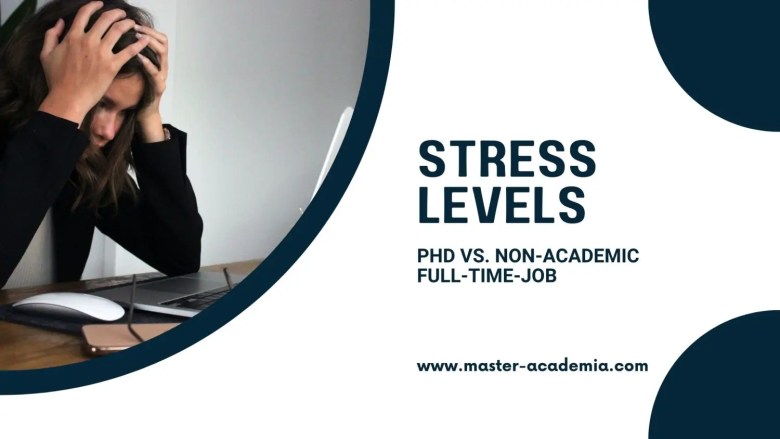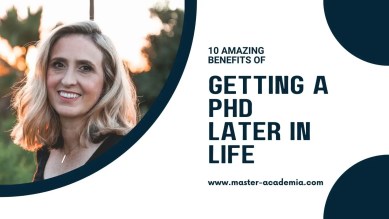
Is pursuing a PhD as stressful as a full-time job? This is a question that many prospective PhD students ask themselves. While it depends on your personality, a PhD can be more stressful than a full-time job outside of academia. Several specific circumstances trigger high-stress levels among PhD students.
Contents
Stress as a subjective experience
Stress is subjective. Every person experiences mental or emotional strain resulting from demanding circumstances differently. Therefore it is difficult to generalize. However, doing a PhD is a unique situation that tends to trigger high levels of stress.
It is useful to have a good understanding of the common types of stress that PhD students experience, and why. On that basis, prospective candidates can evaluate for themselves whether it would be more or less stressful for them to pursue a PhD instead of working full-time outside of academia.
PhD students tend to be perfectionists
The world is full of perfectionists. However, the percentage of perfectionists in academia tends to be higher than in other professions.
Character traits such as an eye for detail and conscientiousness make for a good university student. Standing out by delivering excellent work during a bachelor’s and master’s programme is directly linked to chances of getting a PhD position.
PhD students are often driven and have a high degree of self-awareness. While this has obvious benefits, it often goes hand in hand with excessive self-criticism and unrealistic expectations of themselves.
Perfectionists might strive in demanding circumstances in terms of delivering good outputs. But the process and emotions that they have to go through to achieve these results are often crippling.
To make things worse, perfectionists often compare themselves to others. These ‘others’ in academia are often equally self-critical and work extra hard to overcome insecurities.
Constant stress due to perfectionism and a fear of failure can have real mental and physical consequences (think of depression, arrhythmia or insomnia).
A PhD requires a lot of self-responsibility
Of course, a PhD student (ideally) gets a lot of support from supervisors as well as peers. Some PhD students also work as part of a project team.
However, at the end of the day, the PhD is your project. It has to be written by you alone. And if you succeed, the degree will be awarded to you.
PhD work requires a high degree of self-initiative and proactiveness. Ultimately, you are responsible for the outcome. But this can be challenging when you suffer from perfectionism and imposter syndrome:
Constantly questioning your academic ability, and feeling like a fraud who is not smart enough to deserve a PhD position can create a lot of stress.
When you work for a company or organization, be it in the public or private sector, you are more likely to work as part of a team. I am not saying that you might not feel performance-related stress outside of academia.
Yet, experiencing performance-related stress is often much more individualized when doing a PhD compared to many non-academic full-time jobs.
PhD work feels very personal
In a PhD, the aim is to further academic knowledge. To branch out into unknown territories. To test novel methodologies and develop new theories.
In non-academic jobs, you often learn certain skills and can deal with situations based on existing knowledge. You have a backup, so to speak, from people who generated that knowledge and have done it before you.
In a PhD, you enter unchartered territory. That is the whole point of it. You are supposed to do something new.
Therefore, a PhD feels much more personal.
Feedback and criticism can sting. It can feel like a punch to the gut. It feels like you are criticized personally as if something is wrong with your way of thinking, and your ideas.
During a PhD, your identity becomes very much intertwined with your research. Separating yourself (and your worth) from your work is very hard for PhD students.
Questioning your whole identity is a different – and more constant – stressor than dealing with, for example, a busy period in a non-academic full-time job
PhDs students have a less external structure
Many people doing non-academic work have well-established routines. Very often, working times are non-negotiable.
Yes, it sucks if you have to be up every day at 7, and present at the office at 8. But at some point, you might not even think about getting up anymore. You simply do not have a choice. External pressure is, at times, good.
Have you ever tried getting up early without having to? It requires so much more effort and willpower. Pushing yourself out of bed to start writing on a PhD without a real deadline or external pressure is hard. Like, real hard.
PhD students often have little external structure to their day. They are largely responsible for their time management. Which can be fabulous and I guess that many non-academics envy this flexibility.
However, practising constant self-discipline can also be stressful. Especially when you are stuck and do not know what to do next in your PhD.
Very often, it results in feelings of not working enough. Or the failure to get up at 7, as planned. Which in turn leads to a feeling of guilt to take proper breaks and rest. Long-term stress is a real thing.
Thus, the constant need for self-discipline can create a different type of stress than having to be present in the office from 9-5 every day.
PhD research is often underpaid
Last but not least, when you have a full-time job and consider doing a PhD, the chances are high that you earn a decent salary.
With a few lucky expectations, PhD pay is not great. Or PhD students are only paid part-time and have to take over heavy teaching loads next to their PhD. Or, they are not paid at all.
The effects of lingering financial stress in the background should not be underestimated.
This is coupled with the knowledge that academia is an extremely competitive place. Jobs are scarce. Consequently, many PhDs experience existential stress. Financial stress in the present, while also stressing about the future.
Every person has their own story, their personality and their coping mechanisms to deal with stress. There are also still very good reasons to pursue an academic career.
Simultaneously, many non-academic jobs can be extremely stressful. And if you long for more independent work, self-responsibility and a flexible schedule, a PhD might be the right fit.
(When you experience high levels of stress during your PhD, and if it is negatively affecting your mental health, please reach out to your supervisor or institution for help.)



